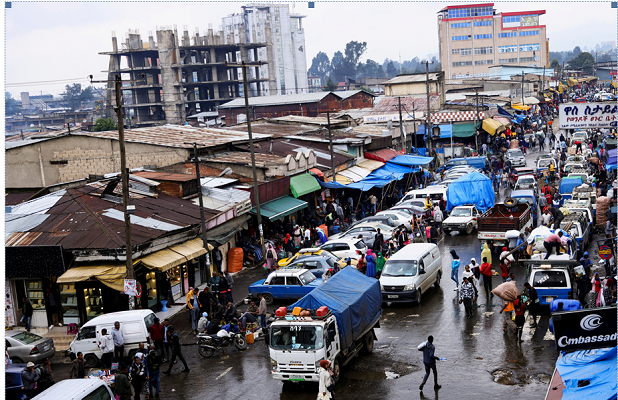
Air pollution is a critical environmental issue that affects countries around the world, including Ethiopia. As a rapidly developing nation in East Africa, Ethiopia faces significant challenges in managing and mitigating air pollution due to various factors such as industrial growth, urbanization, population growth, and inefficient energy consumption practices. The consequences of air pollution have wide-ranging impacts on human health, the environment, and the economy, making it a pressing concern for policymakers, researchers, and the general public in Ethiopia.
Ethiopia has unique ecosystems, but the country is also grappling with the adverse effects of air pollution. Like developed cities in various countries, Addis and other urban areas here in Ethiopia are particularly affected due to the concentration of manufacturing industries and vehicular emissions, among others. Additionally, the country’s reliance on traditional biomass fuels, such as wood and charcoal, for cooking and heating in rural areas contributes significantly to indoor air pollution, further exacerbating the overall air quality concerns.
Urbanization is another crucial factor contributing to air pollution in Addis. As more people migrate from rural areas to cities in search of better opportunities, the demand for housing, transportation, and energy increases. Rapid urbanization often leads to increased vehicular traffic, inadequate waste management systems, and the burning of solid waste, all of which contribute to higher levels of air pollution.
The health effects of air pollution in Ethiopia are significant and far-reaching. Exposure to polluted air can lead to respiratory diseases, cardiovascular problems, and other chronic illnesses. Vulnerable populations, such as children, the elderly and those with pre-existing medical conditions, are particularly at risk. The economic consequences of air pollution are also substantial, as healthcare costs rise, workforce productivity declines and environmental damage affects agricultural productivity and tourism.
The Prime Minister of Ethiopia, Abiy Ahmed (PhD), recently initiated a groundbreaking movement called “Clean Ethiopia,” aimed at fostering a culture of cleanliness within communities. Emphasizing the significance of modern sanitation practices, he highlighted the importance of constructing state-of-the-art toilets that promote cleanliness and garner respect from the public.
The Prime Minister urged citizens to unite in the pursuit of clean, hygienic cities, thereby introducing the nationwide cleaning campaign known as “Clean Street – Healthy Life.” By implementing this initiative across all our urban centres, he planned the creation of pristine and comfortable living environments for residents.
Furthermore, he underscored the government’s ongoing efforts to prioritize the establishment of clean and green surroundings over the past few years. This comprehensive approach not only fosters cleanliness but also combats climate pollution, contributing to a healthier and more sustainable future.
Lemesa Gudeta, the Director of the Environmental Pollution Protection Law Enforcement Directorate, has revealed that pollution-related factors claim the lives of approximately 1600 individuals each year in Addis. The findings shed light on the perilous consequences of pollution and highlight the urgent need for comprehensive measures to safeguard public health.
He emphasized that the alarming statistics are significantly attributed to the concentration of industries within Addis, with approximately 60 per cent of the country’s industrial facilities being located in the city. The release of harmful effluents from these industries has led to the contamination of vegetables and subsequent health implications for the population.
He further stressed that a considerable number of the top ten globally recognized fatal diseases are directly linked to pollution. It is therefore imperative for society to acknowledge this grave concern and actively engage in protecting the environment from further degradation.
In response to the growing crisis, the Addis Ababa City Environmental Protection Authority recently organized an awareness forum targeting artists, social media experts, athletes, and influential personalities from various fields. The objective of the forum was to educate and engage these individuals in understanding the nature of environmental pollution and implementing universal prevention strategies.
According to Dida Dirriba, the General Manager of Authority, a city-wide, six-month campaign to combat environmental pollution was launched in April. The campaign aims to raise awareness among over 2.7 million residents of Addis Ababa about the pressing need to address pollution-related challenges.
He highlighted the alarming fact that the pollution level in Addis is higher than the standard set by the World Health Organization. This severe pollution has had a detrimental impact on natural resources, thereby negatively affecting the health and well-being of future generations.
One of the major concerns raised by the General Manager is the improper disposal of industrial effluents into rivers. As a result, the edible vegetables grown in these contaminated water sources pose a significant threat to the health of the residents of the city.
As part of the ongoing campaign, Dida emphasized that the authority will focus on raising awareness about different types of pollution each month. The initiative began with addressing the issue of plastic pollution in April, and the upcoming month of May will be dedicated to combating air pollution.
The authorities believe that by fostering a change in public mindset and implementing effective awareness programs, significant progress can be made in mitigating pollution-related risks and safeguarding the health and well-being of Addis Ababa’s residents.
The battle against pollution requires collective efforts from all stakeholders, including industries, institutions, government bodies, and the general public. By adopting sustainable practices, implementing stricter regulations, and promoting eco-friendly alternatives, Addis Ababa can pave the way towards a cleaner and healthier environment for its citizens.
As the campaign gains momentum, concerned citizens and organizations are hopeful that these initiatives will pave the way for a cleaner, greener and healthier future for Addis Ababa and serve as a model for other cities grappling with similar challenges. Also, individuals and communities must join hands in this critical fight against pollution to ensure a better quality of life for current and future generations.
Recognizing the gravity of the situation, the Ethiopian government, along with international organizations and civil society, has taken steps to address air pollution. Initiatives include the development of air quality monitoring networks, the promotion of cleaner energy sources, the implementation of regulations to control industrial emissions, and public awareness campaigns to educate communities about the impacts of air pollution.
Besides, air pollution poses a significant challenge to Ethiopia’s sustainable development and the well-being of its population. The country’s industrial growth, urbanization, and reliance on traditional biomass fuels contribute to poor air quality, which has adverse effects on human health, the environment, and the economy. Addressing air pollution requires concerted efforts from various stakeholders, including government bodies, industries, communities, and individuals, to implement sustainable solutions and ensure a cleaner and healthier future for Ethiopia.
BY FIKADU BELAY
THE ETHIOPIAN HERALD TUESDAY 14 MAY 2024





